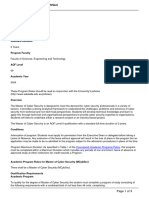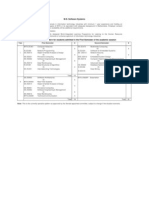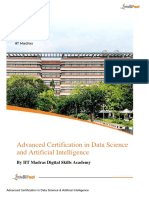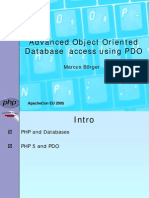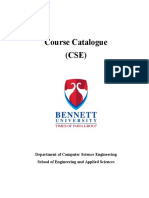Master of Information Technology and Systems (973AA)
Master of Information Technology and Systems (973AA)
Uploaded by
kira_suziniCopyright:
Available Formats
Master of Information Technology and Systems (973AA)
Master of Information Technology and Systems (973AA)
Uploaded by
kira_suziniOriginal Title
Copyright
Available Formats
Share this document
Did you find this document useful?
Is this content inappropriate?
Copyright:
Available Formats
Master of Information Technology and Systems (973AA)
Master of Information Technology and Systems (973AA)
Uploaded by
kira_suziniCopyright:
Available Formats
Master of Information Technology and Systems (973AA)
Award: Master of Information Technology and Systems Faculty: Faculty of Information Sciences & Engineering University Admissions Centre (UAC) Course Code: 882267 CRICOS Code: 064327C Offered Locations and Delivery Modes: UC Bruce Campus Full Time, Face-to-Face Convener: Dr Girija Chetty Phone: +61 2 6201 2512 Location: Building 11, Room C48 Email: Girija.Chetty@canberra.edu.au Part Time, Face-to-Face Convener: Dr Girija Chetty Phone: +61 2 6201 2512 Location: Building 11, Room C48 Email: Girija.Chetty@canberra.edu.au
Introduction
This advanced course is designed for those with IT qualifications, specifically an Australian equivalent bachelor's degree in IT. The course will advance their IT knowledge and also allow them to expand into new areas. It offers students the opportunity to study new and emerging areas of advanced information technology (IT). The course also has an optional internship program, which bridges the classroom knowledge and the real working environment. Graduates will have a sound theoretical and practical basis for beginning or continuing a professional IT career. Graduates can also continuing to a doctorate program.
Course Requirements
48 credit points, comprising: (a) Required: 3 credit points (b) Restricted choice: 45 credit points as set out below. (a) Required (3 credit points): 6676 Professional Practice in IT G This unit must be taken in the first semester of the course, unless the candidate writes a report to the unit convenor detailing experience or previous study as reasons for replacing this unit with another. (b) Restricted choice (45 credit points) (a) 3 credit points: One of 6678 Systems Project and Quality Management G or 6808 Software Engineering Practice G unless the applicant writes a report to the unit convener detailing experience or previous study as reasons for replacing this unit with another.
(b) 42 credit points: up to 12 credit points at G level and at least 30 credit points at PG level. (i) G level units (up to 12 credit points) G level units should be chosen from the below list to satisfy prerequisite requirements of the PG units in the desired specialisation. 6686 Computers and Programming G 6687 Computer Structures and Networks G 6672 Database Design G 6673 Designing Human-Computer Interaction G 6674 Document and Workflow Management G 6675 Information Systems in Organisations G 7187 Mobile and Wireless Computing G 6689 Security and Support in IT G 7087 Sociology of Technology and Work 6808 Software Engineering Practice G 6677 Systems Analysis and Modelling G 6678 Systems Project and Quality Management G 6691 Web Design and Programming G (ii) PG level units (at least 30 credit points). The units in this list are grouped by specialisation. The rules for selecting units for a given specialisation are given under specialisations below. Please note that in any one year, only a selection of these units will run. Information Systems 6679 Advanced Information Modelling PG 6680 Business Intelligence Systems PG 6681 Database Systems PG 7192 General Systems Theory PG 6682 Information Security PG 7109 Information Systems Management PG 7195 Issues in Interaction Design PG 6688 Knowledge Management Systems PG 8067 Systems Requirements and Procurement PG 6690 System Testing PG 7721 Technology Project PG 7199 Usability Evaluation PG 7194 Informatics Project PG (6cp) 6978 Information Sciences Extension Studies 1 PG 6979 Information Sciences Extension Studies 2 PG Software Engineering 6685 Artificial Intelligence Techniques PG 6776 Biometric Person Authentication PG 6693 Client-Server Computing PG 7146 Coding Theory PG 6697 Computer and Network Security PG 7107 Electronic Commerce: Technical Issues PG 7343 Enterprise Software Systems PG 7190 Face-Voice Authentication PG 7191 Game Programming Techniques PG 7108 Graphics Visualisation Techniques PG 6692 High Speed Networks PG 6682 Information Security PG 6684 Object Oriented Software Design PG 7110 Programming Graphical User Interfaces PG 8067 Systems Requirements and Procurement PG 7197 Soft Computing PG 6690 System Testing PG 7721 Technology Project PG
7721 Technology Project PG 7194 Informatics Project PG (6cp) 6978 Information Sciences Extension Studies 1 PG 6979 Information Sciences Extension Studies 2 PG Network Computing 6693 Client-Server Computing PG 7146 Coding Theory PG 6697 Computer and Network Security PG 7107 Electronic Commerce: Technical Issues PG 6692 High Speed Networks PG 8067 Systems Requirements and Procurement PG 7721 Technology Project PG 7198 Telecom Systems Management and Policy PG 7200 Wireless and Embedded Systems PG 6978 Information Sciences Extension Studies 1 PG 6979 Information Sciences Extension Studies 2 PG Business Informatics 6224 Business Finance PG * # 7106 Business Informatics Case Studies PG * 7188 Current Issues in Business Informatics PG * 7192 General Systems Theory PG 6633 Information Law PG # 6683 IT and Business Alignment PG * 7194 Informatics Project PG (6cp) * 6978 Information Sciences Extension Studies 1 PG 6979 Information Sciences Extension Studies 2 PG 7162 Information Security 7109 Information Systems Management PG 6688 Knowledge Management Systems PG 6255 Management Ethics PG # 8067 Systems Requirements and Procurement PG 7196 Social Informatics PG * 6690 System Testing PG 7721 Technology Project PG * Units with an asterisk have a prerequisite of 2 years work experience. # Units with a hash (#) are only available in the Business Informatics specialisation. Students may be allowed to take one unit (3 credit points) at PG level other than those listed in the specialisations from outside the Faculty of Information Sciences and Engineering, with the permission of the Course Convener. This will count as one G level unit against the requirements of (b) (i) above. (c) A student can normally take at most two of the Information Sciences Extension Studies 1 to 4 PG units. The Course Convener's permission must be obtained if a student wants to study more than two Information Sciences Extension Studies units. The permission will only be given under some unusual circumstances at the discretion of the Course Convener. (d) To complete the course, a student must achieve 48 credit points, which are composed of at most 18 credit points at G level and at least 30 credit points at PG level, under the restrictions of the previous rules (a), (b), and (c). Specialisations: Students may choose to specialise in the areas of Information Systems, Software Engineering, Network Engineering, Business Informatics or double specialisations (with the combination as listed below) - or may have no specialisation. - Software Engineering and Information Systems - Software Engineering and Network Computing
- Software Engineering and Business Informatics For a specialisation, at least 5 units must be taken from the units listed in the respective specialisation list.
Typical Course Structure
Semester 1 YEAR 1 6676 Professional Practice in IT G 6678 Systems Project and Quality Management G OR 6808 Software Engineering Practice G G or PG level unit G or PG level unit YEAR 2 PG level unit PG level unit PG level unit PG level unit Semester 2 G or PG level unit G or PG level unit PG level unit PG level unit PG level unit PG level unit PG level unit PG level unit
Course Duration
4 semesters full-time ro equivalent. maximum 12 semesters.
Admission Requirements
An Australian bachelor degree in Information Technology, Information Systems or Business Informatics or equivalent. Note that some PG level units in Business Informatics have a prerequisite of 2 years professional work experience.
Assumed Knowledge
Knowledge of IT and / or Business Informatics for Business Informatics assumed knowledge includes excellent English oral and written communication skills.
Professional Recognition
This course is accredited by the professional body, the Australian Computer Society, at the Professional level.
2004-2011 University of Canberra
You might also like
- 5 Year Idp Cse - 2013Document146 pages5 Year Idp Cse - 2013JDeekshithReddyNo ratings yet
- AGS-20 - Configuration and Commissioning Guideline - Draft PDFDocument65 pagesAGS-20 - Configuration and Commissioning Guideline - Draft PDFvydaicaNo ratings yet
- Google Certified Professional Cloud Network Engineer: Practice QuestionsFrom EverandGoogle Certified Professional Cloud Network Engineer: Practice QuestionsNo ratings yet
- BCS Higher Education QualificationDocument1 pageBCS Higher Education QualificationMinura MevanNo ratings yet
- Bachelor of Information Technology (322AA)Document3 pagesBachelor of Information Technology (322AA)Jerico LlovidoNo ratings yet
- Adelaide University Calendar - Master of Cyber Security - 2023-11-30Document3 pagesAdelaide University Calendar - Master of Cyber Security - 2023-11-30roll_wititNo ratings yet
- MS Software SystemsDocument2 pagesMS Software SystemskotreshdsNo ratings yet
- Information Technology ProgramsDocument10 pagesInformation Technology Programspankaj_kolekar31088No ratings yet
- UCL Web Science and Big Data AnalyticDocument5 pagesUCL Web Science and Big Data AnalyticSiravich KhongrodNo ratings yet
- Data Overview - Project EngineerDocument2 pagesData Overview - Project Engineerpandurang kadamNo ratings yet
- PG Dad Mission BookletDocument4 pagesPG Dad Mission Bookletveera00792No ratings yet
- 2024 03 22 65fd5f5f917f6 1711103839Document23 pages2024 03 22 65fd5f5f917f6 1711103839Jitendra Kumar BiswasNo ratings yet
- MS Applied Computer Science FlyerDocument2 pagesMS Applied Computer Science FlyerKhsddhaNo ratings yet
- Bit Selection Sheet 3yr Current FinalDocument3 pagesBit Selection Sheet 3yr Current FinalRizzy ShinigamiNo ratings yet
- DEKIN UNIV - InformationtechnologyDocument7 pagesDEKIN UNIV - Informationtechnologyparthi288No ratings yet
- Advanced Certification in Data Science and Artificial IntelligenceDocument18 pagesAdvanced Certification in Data Science and Artificial Intelligenceashok govilkarNo ratings yet
- MTSSDocument5 pagesMTSSSangam JindalNo ratings yet
- My Courses 2Document7 pagesMy Courses 2Siravich KhongrodNo ratings yet
- Iiith Pgcss Partb BrochureDocument20 pagesIiith Pgcss Partb BrochureGenevio RNo ratings yet
- Curriculum and Syllabus - Minor in CSEDocument39 pagesCurriculum and Syllabus - Minor in CSEpa2195No ratings yet
- IIT Jodhpur PG Diploma and MTech in Data Engineering BrochureDocument23 pagesIIT Jodhpur PG Diploma and MTech in Data Engineering BrochureSimiran MohapatraNo ratings yet
- Masters of Information Technology and Masters of Information Technology ManagementDocument6 pagesMasters of Information Technology and Masters of Information Technology ManagementYangzin ThikepaNo ratings yet
- Grad MIS CertificateProgDocument1 pageGrad MIS CertificateProgroh009No ratings yet
- PDF Admission BookletDocument44 pagesPDF Admission Bookletspidermann50687No ratings yet
- Advanced Database Development CSCDocument1 pageAdvanced Database Development CSCBobbyNo ratings yet
- Ajax Yml 9737Document30 pagesAjax Yml 9737mohammadayanafaqNo ratings yet
- MTechSyllabus2012 13Document243 pagesMTechSyllabus2012 13Nitin GoyalNo ratings yet
- Computer EngineeringDocument1 pageComputer EngineeringPhilips B. AkinyeleNo ratings yet
- BSC ComputerScienceDocument3 pagesBSC ComputerScienceBoabeng EdwardNo ratings yet
- Cseit - AllDocument85 pagesCseit - Allankitkumar829301No ratings yet
- Data AnalysisDocument3 pagesData AnalysisAaNo ratings yet
- BSC Computing Prospectus BookletDocument10 pagesBSC Computing Prospectus BookletRushedah PeartNo ratings yet
- Master of Information Technology and Systems (973AA.6) : Domestic StudentsDocument16 pagesMaster of Information Technology and Systems (973AA.6) : Domestic StudentsAmanpreet kaurNo ratings yet
- Notice - 07 May 2023Document7 pagesNotice - 07 May 2023Hasanul KabirNo ratings yet
- Computing Higher Coursework 2014Document4 pagesComputing Higher Coursework 2014afaocsazx100% (2)
- Doe Acc CourseDocument7 pagesDoe Acc CourseRakesh Kumar DNo ratings yet
- Queries (FAQs) UpdatedDocument3 pagesQueries (FAQs) Updatedganshu401No ratings yet
- Resume Victor S 2022 NovDocument3 pagesResume Victor S 2022 NovVictorNo ratings yet
- The University of ArizonaDocument16 pagesThe University of ArizonaR MuhammadNo ratings yet
- MTechSyllabus2012 13Document243 pagesMTechSyllabus2012 13kamalkahamlaNo ratings yet
- UGC NET Computer Science & Application 2019 Exam (Complete Detail)Document14 pagesUGC NET Computer Science & Application 2019 Exam (Complete Detail)Aŋsʜ Tʜɘ ƊɘvɩɭNo ratings yet
- Bsit Plan September 2020Document62 pagesBsit Plan September 2020fostiliydiNo ratings yet
- Information Brochure PGDDS&AIDocument12 pagesInformation Brochure PGDDS&AIPriyanka SharmaNo ratings yet
- TUS - Computer Networks & Systems Management - BSC (Hons)Document12 pagesTUS - Computer Networks & Systems Management - BSC (Hons)Mike MikkelsenNo ratings yet
- Iitk Da GenaiDocument35 pagesIitk Da Genaiilluminati07071997No ratings yet
- Deangelomatthew Csit Ilp f12 gdv3Document4 pagesDeangelomatthew Csit Ilp f12 gdv3api-247120285No ratings yet
- Dip Computer Science 2020Document8 pagesDip Computer Science 2020nathanmlangeniNo ratings yet
- Computer Science (Cyber Security) BSC Honours: Fees (Per Year)Document12 pagesComputer Science (Cyber Security) BSC Honours: Fees (Per Year)KarthikNo ratings yet
- Overview Presentation - It Essentials - CCNADocument37 pagesOverview Presentation - It Essentials - CCNAEuber ChaiaNo ratings yet
- Career Opportunity: ST RDDocument2 pagesCareer Opportunity: ST RDJoy loboNo ratings yet
- CV of Md. Nazmul HossainDocument5 pagesCV of Md. Nazmul HossaintestNo ratings yet
- Pgd-Ai Data ScienceDocument21 pagesPgd-Ai Data SciencewahidjaanNo ratings yet
- Dip Computer Science 2021Document8 pagesDip Computer Science 2021lesegomatlala2022No ratings yet
- FAQs CTIGDocument5 pagesFAQs CTIGtoday's powerNo ratings yet
- Progspec MSC Data Science 2022 23Document20 pagesProgspec MSC Data Science 2022 23shaaficihussein19102022No ratings yet
- The Bachelor of Information Technology Is An Award at AQF Level 7Document2 pagesThe Bachelor of Information Technology Is An Award at AQF Level 7GatewayNo ratings yet
- Career Investigation Report: Bachelor of Applied Information Systems TechnologyDocument11 pagesCareer Investigation Report: Bachelor of Applied Information Systems TechnologyAgar MagarNo ratings yet
- Engineering Service Revenues World Summary: Market Values & Financials by CountryFrom EverandEngineering Service Revenues World Summary: Market Values & Financials by CountryNo ratings yet
- Architecting High-Performance Embedded Systems: Design and build high-performance real-time digital systems based on FPGAs and custom circuitsFrom EverandArchitecting High-Performance Embedded Systems: Design and build high-performance real-time digital systems based on FPGAs and custom circuitsNo ratings yet
- J2EE Complete Reference - Ch01Document19 pagesJ2EE Complete Reference - Ch01Gaurav ChauhanNo ratings yet
- OOAD With Ans and ExplanationDocument6 pagesOOAD With Ans and ExplanationadddataNo ratings yet
- Lab ManualDocument48 pagesLab Manualsneha xx100% (1)
- Chapter 1 - IntroductionDocument8 pagesChapter 1 - IntroductionZam BZnNo ratings yet
- IBM WebSphere Application Server Performance Cookbook - Java RecipesDocument2 pagesIBM WebSphere Application Server Performance Cookbook - Java Recipesnguoituyet66No ratings yet
- Xilinx XC9500 CPLD Series: The Low-Cost Solution For 2.5V, 3.3V, and 5V ApplicationsDocument2 pagesXilinx XC9500 CPLD Series: The Low-Cost Solution For 2.5V, 3.3V, and 5V ApplicationsAntonio VelkovNo ratings yet
- Fractal Robots Seminar Report PDFDocument24 pagesFractal Robots Seminar Report PDFbiswajitsahoo1111No ratings yet
- New Galaxy G1 Measuring System User Manual-190710Document109 pagesNew Galaxy G1 Measuring System User Manual-190710Gabriela ChucuyánNo ratings yet
- The Math Connection LinkedinDocument1 pageThe Math Connection Linkedinapi-247499301No ratings yet
- Mainframe ComputerDocument10 pagesMainframe ComputerSalma SultanaNo ratings yet
- Ftalk qr004 - en PDocument38 pagesFtalk qr004 - en PRexNo ratings yet
- Netflix-: Company OverviewDocument7 pagesNetflix-: Company OverviewMd HussainNo ratings yet
- Graphics: Chapter 7Document27 pagesGraphics: Chapter 7JaneNo ratings yet
- Genetic Programming: An IntroductionDocument481 pagesGenetic Programming: An IntroductionAlonso CasanovaNo ratings yet
- Solution of ODEs With MatlabDocument6 pagesSolution of ODEs With MatlabRafaqat AliNo ratings yet
- Apachecon Advanced Oo Database Access Using PdoDocument37 pagesApachecon Advanced Oo Database Access Using PdoAndreaaSimoesNo ratings yet
- C Program To Reverse An ArrayDocument4 pagesC Program To Reverse An ArrayKarthik GopalakrishnanNo ratings yet
- DSFG Gateways C1 and C2 Series 2: Technical Documentation Function, Operation, Commissioning and MaintenanceDocument54 pagesDSFG Gateways C1 and C2 Series 2: Technical Documentation Function, Operation, Commissioning and MaintenancevishadkapadiaNo ratings yet
- Mitsubishi - ADVANCE - TechNote - Iron and Steel Plant Electrical Equipment PDFDocument36 pagesMitsubishi - ADVANCE - TechNote - Iron and Steel Plant Electrical Equipment PDFkokonut1128No ratings yet
- Get FileDocument1 pageGet FilemeenakshigmNo ratings yet
- Cygwin User's GuideDocument93 pagesCygwin User's GuideCholai KurapaNo ratings yet
- MIL-HBK-29612-3A Development of Interactive Multimedia InstructionDocument119 pagesMIL-HBK-29612-3A Development of Interactive Multimedia InstructionAllison KiptaNo ratings yet
- 07 Sep-601 PCM 600 1p5 Work FlowDocument7 pages07 Sep-601 PCM 600 1p5 Work FlowHimdad TahirNo ratings yet
- Software TERCO HV9104 High VoltageDocument21 pagesSoftware TERCO HV9104 High Voltagejulian LozanoNo ratings yet
- Cics Level 2Document44 pagesCics Level 2Vivek DograNo ratings yet
- Tutorial DNV - AUTOPIPEDocument25 pagesTutorial DNV - AUTOPIPESulist N WahyudieNo ratings yet
- Ekahau TagsDocument5 pagesEkahau TagsWissam ShehabNo ratings yet
- Linphone CallDocument3 pagesLinphone CallvitryNo ratings yet
- CSE Course Catalogue Detailed SyllabusDocument195 pagesCSE Course Catalogue Detailed SyllabusTech BanditsNo ratings yet






